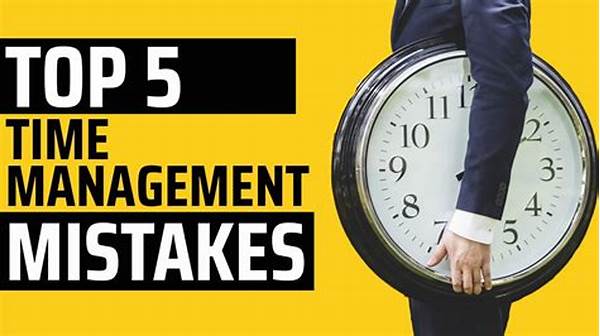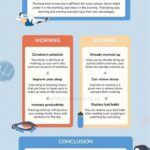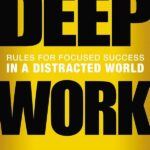- Time Management Mistakes to Avoid in 2025
- Description of Time Management Mistakes to Avoid in 2025
- Summaries on Time Management Mistakes to Avoid in 2025
- Objectives for Mastering Time Management in 2025
- Discussion on Time Management Mistakes to Avoid in 2025
- Illustrations of Time Management Mistakes to Avoid in 2025
Time Management Mistakes to Avoid in 2025
In the fast-paced world of 2025, effective time management has become more critical than ever. With the digital age in full swing, distractions are a mere click away, and the line between work and personal life is ever-blurring. As technology continues to advance at lightning speed, it brings with it the potential for both great productivity and time-consuming pitfalls. Imagine walking a tightrope; one misstep could mean a significant loss in productivity or peace of mind. That’s the challenge we face today. The good news is that with awareness, these obstacles can be avoided. Whether you’re a college student, a corporate professional, or an entrepreneur, understanding the time management mistakes to avoid in 2025 can empower you to stay ahead of the curve and make the most out of each day.
Read More : Quotes About Time Management
Many professionals today find themselves entangled in a web of endless notifications, meetings, and deadlines. Let’s be honest, we’ve all been there—those days when you sit down at your desk and, despite working tirelessly, find yourself wondering where all the time went. The key to reclaiming your day lies in understanding the most common time-traps of 2025 and how to sidestep them. This article aims to do just that and provide a roadmap to help you not only meet your goals but exceed them. Buckle up as we dive into the world of productivity pitfalls and discover how to master the art of managing time.
In an era where every second counts, efficiency could very well be your secret weapon. But the journey doesn’t have to be overwhelming. While it may seem like there are endless potential mistakes you could be making, identifying the major ones is a fantastic start. We’re here to make sure you have the insights you need to make informed decisions about your time. So, let’s delve into the fascinating world of time, find out what can go wrong, and how to ensure the clock works in your favor.
The Most Common Time Management Mistakes in 2025
One of the most prevalent mistakes in time management is over-scheduling. With numerous productivity tools at your fingertips, it’s tempting to fill every minute with tasks and activities. However, this can lead to burnout and reduced efficiency. Instead, incorporate breaks and downtime into your schedule, because no matter how efficient a tool promises to be, humans need rest to perform at their peak.
Another major pitfall is neglecting to prioritize tasks effectively. In 2025, the sheer volume of information and tasks can be overwhelming. It’s easy to get caught up in low-priority tasks because they seem urgent. Developing a clear understanding of what tasks align with your overall goals is crucial. Use techniques like the Eisenhower Box to distinguish between what’s truly important and what can be rescheduled or delegated.
Finally, a common mistake is underestimating the power of saying ‘no.’ Whether it’s taking on additional projects at work or social commitments, it’s essential to recognize your limits. While collaboration and networking are important, spreading yourself too thin can detract from your most important tasks. Learning to say ‘no’ politely but firmly is a valuable skill that can significantly impact your time management effectiveness.
Description of Time Management Mistakes to Avoid in 2025
Embarking on the journey to optimize your time management in 2025 is something that captivates many, yet the path is wrought with common mistakes that can easily disrupt your stride. The core issue lies not just in time but in managing one’s focus and energy effectively amid the demands of modern life. In a world saturated with digital novelties, the risk of refocusing on trivialities over truly significant matters is higher than ever. Learning to identify and avoid these time management mistakes to avoid in 2025 is vital for anyone looking to enhance their productivity and personal satisfaction.
Recognizing the Pitfalls
One major pitfall is the digital distraction so prevalent today. Social media platforms, while a great means to connect, can quickly turn into time sinks if not managed properly. A casual five-minute break on a social media app can morph into a thirty-minute interruption. The fundamental step to countering this lies in self-discipline coupled with using tools that limit usage. Setting clear boundaries about when and how long you’ll engage with these platforms can preserve your time for more fruitful endeavors.
Adapting with the Future in Mind
As routines change, the way we manage time must also evolve. For instance, remote work has become more integrated into various industries, bringing with it both flexibility and the challenge of home distractions. It’s vital to create a designated workspace and adhere to a consistent schedule, treating home-based work with the same seriousness as in-office work. Understanding that this mixture of work and home life requires new strategies is key to avoiding the classic time management mistakes to avoid in 2025.
Habits and Solutions
One transformative piece of advice is to build habits that align your daily activities with your larger goals. Start each day by identifying the tasks that require your utmost focus and tackle them when your energy levels are at their peak. Employing strategic rest, such as periodic short breaks or even activities that invigorate your creative energies, can make a huge difference. By acknowledging these habits and focusing on solutions, avoiding the time management mistakes to avoid in 2025 is achievable for anyone willing to make slight but powerful adjustments.
Summaries on Time Management Mistakes to Avoid in 2025
Objectives for Mastering Time Management in 2025
As we look ahead to 2025, mastering time management is more than just setting alarms or drafting checklists—it’s about transforming how we perceive and engage with time. Our first objective is to inspire individuals to recognize the importance of time as not just a resource but a unique currency. This mindset shift is facilitated by awareness and education on the broader implications of time management mistakes to avoid in 2025, drawing lessons from both successes and failures of the past few years.
In a rapidly evolving workspace, whether remote or in-office, the ability to adapt is paramount. Our next objective focuses on equipping individuals with the tools necessary to adapt traditional time-management techniques to modern demands. This involves integrating technology wisely without allowing it to morph into a distraction. We aim to encourage proactive adjustments that consider new work-life dynamics, digital detoxing strategies, and the creation of effective routines that cater to individualized work settings.
Lastly, fostering a strong community of practice is essential. Encouraging dialogue and continuous learning among peers can provide fresh perspectives on avoiding time management mistakes to avoid in 2025. We envision a platform where experiences are shared, and strategies are discussed, creating a ripple effect that extends beyond professional environments into personal growth. By taking collective action, individuals can become catalysts in shaping a culture that values and effectively manages time as a critical and finite asset.
Proactive Strategies and Adaptation
By focusing on the objectives outlined, individuals and organizations can effectively revolutionize and streamline their approach to time management in 2025. Anticipate challenges and strategize around them to cultivate an environment conducive to efficiency and wellbeing, ensuring you’re poised for whatever the future holds.
Discussion on Time Management Mistakes to Avoid in 2025
Understanding the intricacies of time management mistakes to avoid in 2025 is crucial as the world continues to merge digital advancements with everyday routines. The fast-paced evolution of technology has redefined how tasks are approached—introducing efficiencies but also pitfalls that have grown in complexity. To navigate this landscape effectively, a thorough examination of time management strategies is needed, bearing in mind the nuanced challenges of our time.
Living in an era where hyper-connectivity is the norm, it becomes easy to succumb to the mistaken belief that multitasking equals productivity. However, research consistently refutes this, showing that productivity often decreases as one attempts to juggle multiple tasks simultaneously. Instead, focus on mono-tasking—devoting attention to one task at a time, seeing it through before moving on. This approach not only enhances quality but also reduces stress, which is an often overlooked yet critical element of time management mistakes to avoid in 2025.
Emphasizing Quality over Quantity
The common misconception that more tasks equate to greater accomplishment can often backfire, leading individuals to feel overwhelmed. Analyzing work patterns and prioritizing quality over quantity ensures that efforts are aligned with outcomes. People need to reassess their methods periodically—emphasizing strategic effort rather than sheer volume. This shift helps to combat the fatigue that creeps in when juggling numerous responsibilities with no clear direction.
Digital Detox Strategies
In an age where our lives are shared virtually, another time management challenge is being constantly “on.” The influx of notifications and digital alerts becomes a barrier rather than a bridge to reaching productivity. Instituting periods of digital detox—either through app limitations or scheduled screen-free time—creates an environment where focus can thrive. Incorporating this practice regularly safeguards against the potential pitfall of distraction, making it an essential strategy relating to time management mistakes to avoid in 2025.
Furthermore, standard techniques like prioritization and goal setting remain ever pertinent, serving as foundational blocks. They encourage a reflective and proactive stance—prompting individuals to regularly align daily tasks with long-term objectives. This reflection is highly effective but requires regular revisiting, especially in an era where rapid changes are the only constant. Lack of adherence to these principles can quickly derail plans and progress, underscoring the critical importance of time management practices moving forward.
Expanding on these lessons, collaborative tools have ushered in a new dimension of teamwork and sharing of responsibilities, yet they also present a double-edged sword. Embracing shared platforms while maintaining control over one’s tasks is a balancing act. Understanding team dynamics and how digital collaboration influences personal workload is vital. Developing personal boundaries becomes crucial to not only manage expectations but also to contribute effectively without sacrificing personal objectives or well-being.
In sum, efficiently navigating time management mistakes to avoid in 2025 involves a blend of updated practices and adaptive strategies that respond well to both digital and personal life demands. Each step taken provides valuable insights, turning challenges into opportunities. The journey involves transformations that are not simply reactive but proactive, aligning seamlessly with the ebb and flow of modern life.
Illustrations of Time Management Mistakes to Avoid in 2025
Understanding these illustrations makes recognizing and avoiding these pitfalls easier, serving as reminders of the importance of managing time effectively. By internalizing these visual triggers, steering clear from common time management mistakes to avoid in 2025 becomes part of an everyday practice.
Expanding Perspectives Through Visualization
It’s crucial to understand that the visual representations of these time management challenges serve more than just an artistic purpose. They are cognitive tools to increase awareness and facilitate a shift towards more efficient behaviors. Whether through storytelling, humor, or stark realizations, each illustration holds the potential to evoke change and inspire more controlled, deliberate use of time in daily life.


